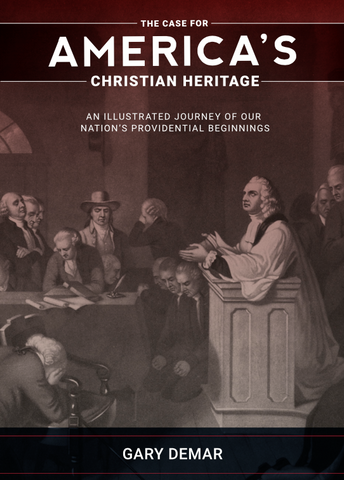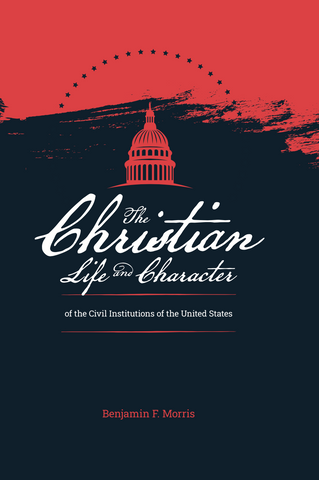Every time American Vision promotes the 1864 book The Christian Life and Character of the Civil Institutions of the United States on Facebook, the historical know-it-alls come out of the woodwork. They spew the typical cliches.
• The United States was founded as a secular nation.
• Our nation’s founders were deists, and they used deistic language instead of biblical language.
Long before 1776 and 1787 when the Constitution was drafted, there was a nation. States existed before they were united. Thirteen colonies became states and united to establish a union of states. The Constitution did not abrogate the content of those states. For example, in Pennsylvania’s 1776, legislators were required to affirm, “I do believe in one God, the Creator and governor of the universe, the rewarder of the good and the punisher of the wicked. And I do acknowledge the scriptures of the Old and New Testament to be given by divine inspiration.”
Historian Mark David Hall comments:
And when Pennsylvania revisits its Constitution, first in 1783 and then in 1790, they [Jews] say, “What about us? We can be good citizens.” And so in 1790, Pennsylvania changes its religious test. It doesn’t abolish it, but it just removed that business about the New Testament. But you still have to be a theist in order to hold civic office. And now Jews can hold office, as can Christians. But atheists are still banned from public office.
Pennsylvania and the constitutions of other states dispel the claim that the United States was founded as a secular nation. In 1787, 11 of the 13 states still had religious tests for office holders. It’s true that the US Constitution prohibits a religious test for national office holders, but that prohibition did not affect the states.
If atheists were banned from holding civil office and in some states from serving on juries, then at that time the United States was not a secular nation, although it was moving that way. Thomas Jefferson was not an atheist, and neither was Benjamin Franklin. If Franklin was, then why did he say the following at the Constitutional Convention?
Only a virtuous people are capable of freedom. As nations become corrupt and vicious, they have more need of masters. I have lived, Sir, a long time [addressing George Washington], and the longer I live, the more convincing proofs I see of this truth, that God governs in the affairs of men. And if a sparrow cannot fall to the ground without His notice, is it probable that an empire can rise without his aid? We have been assured, Sir, in the Sacred Writings, that “except the Lord build the House, they labor in vain that build it” [Psalm 127]. I firmly believe this; and I also believe that without His concurring aid we shall succeed in this political building no better, than the Builders of Babel: We shall be divided by our partial local interests; our projects will be confounded, and we ourselves shall become a reproach and bye word down to future ages. And what is worse, mankind may hereafter from this unfortunate instance, despair of establishing governments by human wisdom and leave it to chance, war and conquest.[1]
A frequent charge is that deistic language was used instead of biblical language. As we saw above in the case of Franklin, he boldly quoted the Bible and cited three biblical examples. The Bible was quoted more often than any Enlightenment source.
“Following an extensive survey of American political literature from 1760 to 1805, political scientist Donald S. Lutz reported that the Bible was cited more frequently than any European writer or even any European school of thought, such as Enlightenment liberalism or republicanism. The Bible, he reported, accounted for approximately one-third of the citations in the literature he surveyed. The book of Deuteronomy alone is the most frequently cited work, followed by Montesquieu’s The Spirit of the Laws. In fact, Deuteronomy is referenced nearly twice as often as Locke’s writings, and the Apostle Paul is mentioned about as frequently as Montesquieu.[2]
In addition to specific references to the Bible, the Founders often used words that some have argued were not part of genuine Christian language. Mark David Hall easily dispels that claim:
Some scholars have argued that the use of “distant” words for God or “vague and generic God-language” like “Nature’s God,” Creator,” and “Providence” in the Declaration and other texts is evidence that the Founders were deists.[3] However, indisputably orthodox Christians regularly used such appellations.
For instance, the Westminster Standards (a classic Reformed confession of faith), both in the original 1647 version and in the 1788 American revision, refer to the deity as “the Supreme Judge,” “the great Creator of all things,” “the first cause,” “righteous judge,” “God the Creator,” and “the supreme Law and King of all the world.” The Standards also regularly reference God’s providence and even proclaim that “[t]he light of nature showeth that there is a God….” Similarly, Isaac Watts, the “father of English Hymnody,” referred to the deity as “nature’s God” in a poem about Psalm 148: 10. Jeffry H. Morrison has argued persuasively that the Declaration’s references to “‘divine Providence’ and ‘the Supreme Judge of the World’ would have been quite acceptable to Reformed Americans in 1776, and conjured up images of the ‘distinctly biblical God’ when they heard or read the Declaration.”
*****
Even though Jefferson believed in a vague, distant deity, when his fellow delegates revised and approved the Declaration, virtually all of them understood “Nature’s God,” “Creator,” and “Providence” to refer to the God of Abraham, Isaac, and Jacob: a God who is active in the affairs of men and nations.[4]
Our schools no longer teach critical thinking, and many Facebook Warriors don’t know how to do research. They “know” what’s true because they’ve read about it on the Internet usually from people who (1) don’t cite original sources and/or (2) cherry pick what already fits with their operating assumptions.

The Case for America’s Christian Heritage
It’s not enough, however, to relive history. There’s much work before us to reset the foundation stones of a firm reliance on Divine Providence. We need to heed the words of Benjamin Franklin who quoted Psalm 127:1 during the drafting process of the Constitution: “except the Lord build the house they labor in vain that build it,” and “that without His concurring aid we shall succeed in this political building no better, than the Builders of Babel.” The principles that were true and necessary centuries ago for building nations are equally true and necessary today.

The Christian Life and Character of the Civil Institutions of the United States
Benjamin Franklin Morris’ book has been out of print for over 100 years. If you can find an original copy, it’s only because you have looked in the deep recesses of university libraries where the volume is likely collecting dust on dimly lit library shelves. Organizations like the ACLU and Americans United for Separation of Church and State have done their best to ignore the content of the massive compilation of original source material found in this book. If Americans ever become aware of the facts assembled by the author in this historic encyclopedia of knowledge, arguments for a secular founding of America will turn to dust.
[1] Benjamin Franklin, The Writings of Benjamin Franklin, ed. Jared Sparks (Boston: Tappan, Whittemore and Mason, 1840), 9:297.
[2] Daniel L. Dreisbach, How the Bible influenced the Founding Fathers (November 23, 2016). Also see Dreisbach’s book Reading the Bible With the Founding Fathers (New York: Oxford University Press, 2017), 2-3, 8.
[3] See, for instance, Holmes, Faiths of the Founding Fathers, pp. 47, 65; Fea, Was America Founded as a Christian Nation?, pp. 131–33, 136.
[4] Westminster Standards, 1: 10; 5: 1, 2, 6; 19: 5; 23: 1; 1: 1, 7; 5; and 21: 5. See also The Works of the Late Reverend and Learned Isaac Watts (London, 1753), Vol. 4, p. 356, and The Windham Herald, April 15, 1797, p. 4. Such examples could be multiplied almost indefinitely. Jeffry H. Morrison, “Political Theology in the Declaration of Independence,” paper delivered at a conference on the Declaration of Independence, Princeton University, April 5-6, 2002. I am grateful to Daniel L. Dreisbach for pointing me to the language of the Standards.
















